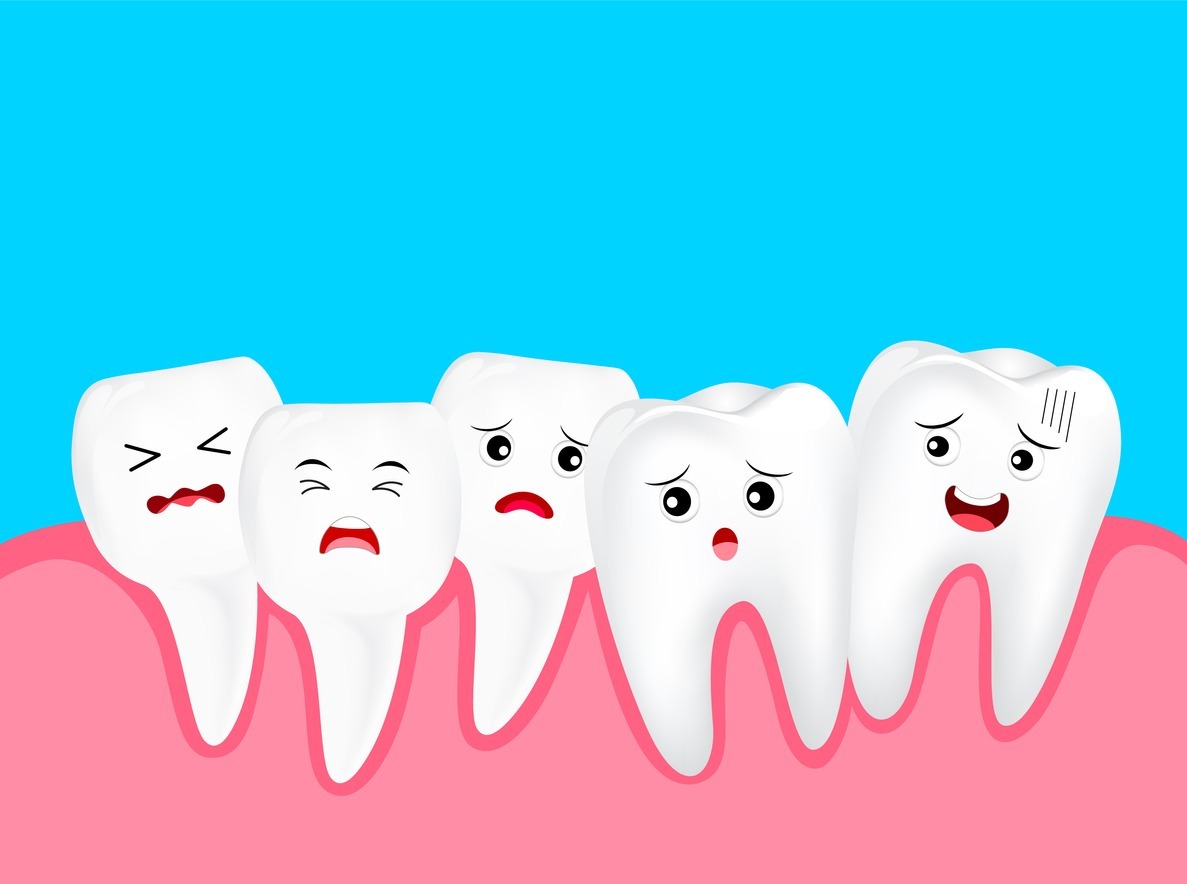6 Causes of Uneven Shifting Teeth

Even if you believe your teeth are fixed in place, they actually move and adjust position throughout your life. This is normal and unproblematic in most cases. However, in some cases, this movement is more pronounced, resulting in crookedness (malocclusion) and, in some cases, tooth pain.
Teeth change position for various reasons, including wearing braces, having teeth extracted, grinding teeth, jaw growth, and gum disease. Even using a continuous positive airway pressure (CPAP) therapy device to help with sleep issues can cause teeth to shift. This article discusses the causes of tooth shifting as well as treatment options.
1. Braces
Braces are brackets that are worn on the teeth to straighten them by applying increasing pressure to them. Other orthodontic treatments, such as wearing Invisalign (clear braces) or different types of removable retainers and appliances, can also be used or may be required to keep the adjusted smile.
While braces and other orthodontic treatments are effective at correcting uneven smiles, teeth can shift back to their original positions. For example, if you lose your retainer or stop wearing it after your braces are removed, your teeth may gradually revert to their original state.
Furthermore, problems with fixed retainers, which are permanently bonded to teeth, can cause significant movement. These, like other types, are frequently installed after braces to maintain tooth alignment. Issues with these retainers, such as broken wires and bonding agent problems, can cause teeth to shift.
2. Tooth Removal
Tooth removal is another common cause of tooth shifting (also known as tooth extraction). This may be done to correct tooth crowding, crookedness, dental abscesses, advanced gum disease, tooth impaction, and trauma or fall damage.
Following a dental extraction, or if a tooth is lost and an open space results, the remaining teeth naturally reposition themselves, gradually filling in the gaps.
3. Tooth Grinding
Tooth grinding, also known as bruxism, can lead to various dental problems. People in these situations grind their teeth and clench or tighten their jaws excessively, which can cause tooth damage. Some people clench or grind primarily at night, which is more problematic, while others clench or grind throughout the day due to stress or tension.
Bruxism may affect the position and integrity of your teeth, causing headaches, jaw pain, and clicking and popping in the jaw. In addition, this behavior's consistent pressure on the teeth may cause teeth to shift, resulting in crooked teeth and other issues.
4. Jawbone Growth
The upper and lower jaws—the maxilla and mandible, respectively—grow and change shape throughout childhood, adolescence, and young adulthood. During the adolescent years, mandible growth typically outpaces maxillary growth, resulting in tooth crowding in your lower set of teeth. Furthermore, this can result in malocclusion.
In most cases, the resulting tooth shifting is not a problem. However, it is possible that bite changes will occur, necessitating treatment.
5. Gum Disease
Gingivitis (inflamed, bleeding gums) and periodontitis (infected gums) can also cause tooth shifting due to secondary bone loss. Periodontitis (a complication of gingivitis) causes the underlying bone to deteriorate, causing teeth to become loose or fall out. As a result of this condition, some people experience significant tooth mobility.
6. CPAP
Continuous positive airway pressure (CPAP) therapy is the use of a special device to treat sleep apnea, a condition that causes snoring and breathing disruptions. The CPAP machine, which is worn overnight, delivers filtered, pressurized air through a tube connected to a full-face mask, a nasal mask, or nasal pillows (earbud-like inserts for the nostrils).
Using a CPAP device can cause teeth to shift out of alignment in rare cases, resulting in uneven shifting. It is thought that the air pressure pushes the tongue forward, causing shifting and flaring in the front teeth. Furthermore, retraction or a slant inward of upper teeth has been reported due to full-face mask use.
Post a comment